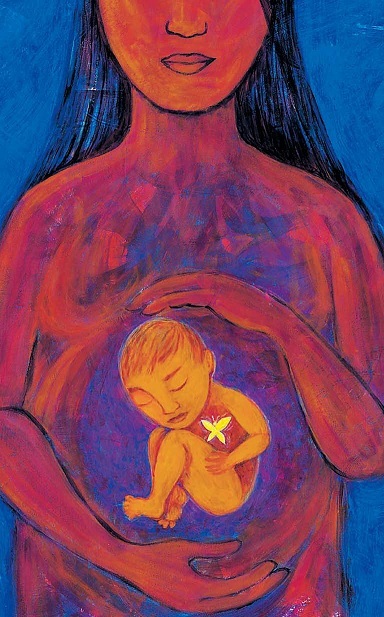In the year of the black dragon many people are planning to have babies with “good fortune.”
However, pregnancy takes caution as well as enthusiasm. One thing expectant mothers should bear in mind ― especially those older than 35 ― is preeclampsia.
Preeclampsia is when a pregnant woman develops high blood pressure and protein in the urine after the 20th week, which is in the middle of the second trimester of pregnancy.
The U.S. National Institute of Health says the main symptoms of preeclampsia are excessive swelling of the hands and face/eyes; sudden weight gain over one to day days with more than 2 pounds (about 1 kilogram) a week; a consistent headache; pain on the right side of the belly, below the ribs or also in the right shoulder ― this could be confused with heartburn, gallbladder pain, a stomach virus or the baby kicking.
However, pregnancy takes caution as well as enthusiasm. One thing expectant mothers should bear in mind ― especially those older than 35 ― is preeclampsia.
Preeclampsia is when a pregnant woman develops high blood pressure and protein in the urine after the 20th week, which is in the middle of the second trimester of pregnancy.
The U.S. National Institute of Health says the main symptoms of preeclampsia are excessive swelling of the hands and face/eyes; sudden weight gain over one to day days with more than 2 pounds (about 1 kilogram) a week; a consistent headache; pain on the right side of the belly, below the ribs or also in the right shoulder ― this could be confused with heartburn, gallbladder pain, a stomach virus or the baby kicking.

Other symptoms according to the NIH include irritability; not urinating very often; nausea and vomiting, which can be severe; and change in vision, either temporary blindness, seeing flashing lights or spots, sensitivity to like or blurry vision.
Older women should be extra attentive of preeclampsia, since the disorder is diagnosed more among them than the younger demographic.
According to the National Health Insurance Corporation, a total of 2,034 women have been treated for preeclampsia in 2011. The agency found that the older the mothers-to-be were, the more likely they were to be diagnosed with the disease ― only 3.8 per every 1,000 pregnant women in their 20s were diagnosed with preeclampsia, but the ratio jumped to 10.1 among 40-somethings.
“It may be the weakened uterus function that affects the overall condition. Older pregnant women are more likely to prevail with hypertension or diabetes during their pregnancy, too. Those may affect the preeclampsia,” Dr. Kim Eui-hyuk of Ilsan Hospital said.
He advised pregnant women 35 and older to visit their doctors more often and check their blood pressure frequently. If it is over 140/90mmHg, they should consult their doctors.
“If women have hypertension, diabetes, lupus or other diseases, or are obese or pregnant with twins, they should be even more careful,” he said.
By Bae Ji-sook (baejisook@heraldcorp.com)
-
Articles by Korea Herald



![[AtoZ into Korean mind] Humor in Korea: Navigating the line between what's funny and not](http://res.heraldm.com/phpwas/restmb_idxmake.php?idx=644&simg=/content/image/2024/04/22/20240422050642_0.jpg&u=)


![[Exclusive] Korean military set to ban iPhones over 'security' concerns](http://res.heraldm.com/phpwas/restmb_idxmake.php?idx=644&simg=/content/image/2024/04/23/20240423050599_0.jpg&u=20240423183955)
![[Herald Interview] Why Toss invited hackers to penetrate its system](http://res.heraldm.com/phpwas/restmb_idxmake.php?idx=644&simg=/content/image/2024/04/22/20240422050569_0.jpg&u=20240422150649)
![[Graphic News] 77% of young Koreans still financially dependent](http://res.heraldm.com/phpwas/restmb_idxmake.php?idx=644&simg=/content/image/2024/04/22/20240422050762_0.gif&u=)







![[Exclusive] Korean military to ban iPhones over security issues](http://res.heraldm.com/phpwas/restmb_idxmake.php?idx=652&simg=/content/image/2024/04/23/20240423050599_0.jpg&u=20240423183955)



![[Today’s K-pop] Ateez confirms US tour details](http://res.heraldm.com/phpwas/restmb_idxmake.php?idx=642&simg=/content/image/2024/04/23/20240423050700_0.jpg&u=)